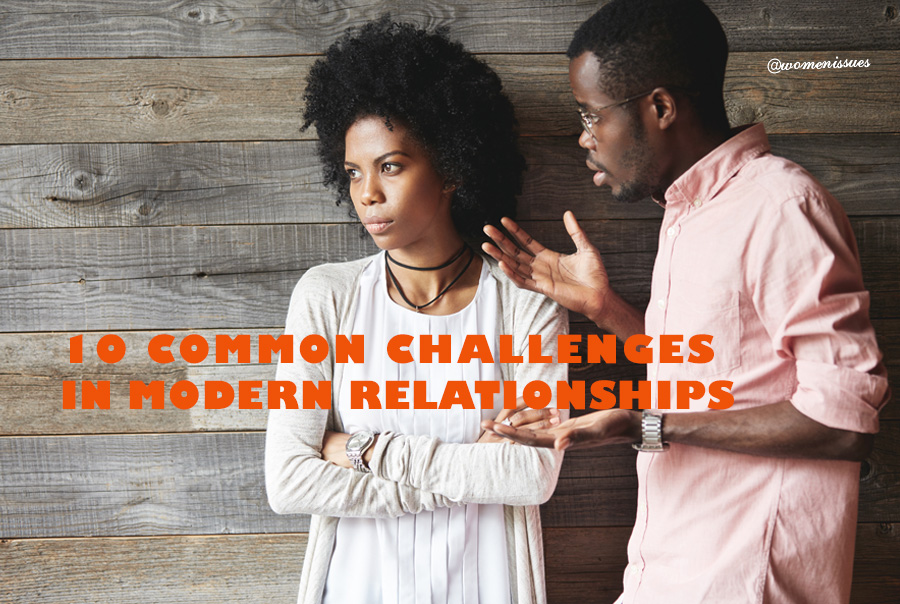Modern relationships have evolved significantly due to changes in societal norms, technology, and communication patterns. While they offer new opportunities for connection and growth, they also present unique challenges. Here, we’ll explore 10 common challenges in modern relationships, along with explanations of each
- DIGITAL DISTRACTIONS
In the age of smartphones and social media, it’s easy to become engrossed in screens, leading to reduced quality time between partners. It’s essential to recognize the impact of these distractions and create designated “device-free” times to connect genuinely. Set boundaries, such as no phones at the dinner table or during intimate conversations. These moments of focused attention can strengthen your bond. - COMMUNICATION BREAKDOWNS
Despite the plethora of communication tools, misunderstandings and emotional distance can occur. Effective communication involves active listening and empathetic understanding. Be attentive to your partner’s verbal and nonverbal cues, and encourage open dialogue. Practice “I” statements to express your feelings without blaming, and be willing to listen and validate your partner’s perspective. Express clearly how you think and feel. - BALANCE INDEPENDENCE & TOGETHERNESS
Modern relationships often emphasize personal growth and autonomy. While this is healthy, it’s essential to strike a balance. Encourage each other’s individual aspirations, but also invest in shared experiences. Find activities that you both enjoy and set aside quality time for one another. Strong relationships thrive when partners support each other’s growth while cherishing their togetherness. - WORK-LIFE BALANCE
The demands of work, personal responsibilities, and technology can strain relationships. Honest conversations about work-related stress and setting boundaries are crucial. Designate specific times as “relationship time,” where you prioritize each other over work or screens. Seek ways to support one another’s career goals while creating a harmonious work-life balance. - TRUST & JEALOUSY
Trust issues can arise due to past experiences or feelings of insecurity. Social media and easy access to information about others can amplify these concerns. Building trust requires open conversations about past experiences, addressing insecurities, and reaffirming your commitment. Create a safe space where both partners can express their feelings without judgment. - LONG-DISTANCE RELATOINSHIPS
As career opportunities and education often lead to physical separation, maintaining intimacy in long-distance relationships can be challenging. Effective communication is paramount. Regular video calls, planning visits, and sharing experiences from your separate lives can help bridge the gap. Trust and clear communication about your expectations for the relationship are vital to its success. - CHANGING GENDER ROLES
Evolving gender roles in modern society affect relationship dynamics. It’s essential to have honest conversations about shared responsibilities, expectations, and values. Acknowledge that traditional roles may not apply, and define what works best for both partners. Flexibility and understanding each other’s perspectives can lead to more equitable and harmonious relationships. - FINANCIAL STRESS
Economic pressures and differing financial habits can lead to tension. Open, non-judgmental discussions about financial goals, budgeting, and spending patterns are vital. Create a joint financial plan that aligns with both your short-term and long-term objectives. Understanding each other’s attitudes toward money and being transparent about financial matters can alleviate stress. - TIME MANAGEMENT
Busy schedules can make it challenging to spend quality time together. Prioritize the relationship by scheduling regular date nights, shared activities, or even short breaks throughout the day to check in with each other. Keep the lines of communication open, express your needs for connection, and ensure you’re dedicating time to nurture the emotional bond that brought you together. - FADING INTIMACY
Routine and external stressors can lead to a decrease in physical and emotional intimacy. Continuously nurturing the emotional bond is crucial. Communicate your needs and desires, try new experiences together, and express affection regularly. Make intimacy a priority, both physically and emotionally, and be open to exploring ways to reignite the spark.
By addressing these challenges with empathy, open communication, and a proactive mindset, couples can foster healthy, fulfilling relationships that thrive in the complexities of the modern world. Remember, relationships require ongoing effort and adaptation, but the rewards of a strong, resilient partnership are well worth it.
“WHEN YOU ARE IN LOVE, YOU STAY SENSITIVE TO EACH OTHER’S NEEDS”


No Comment